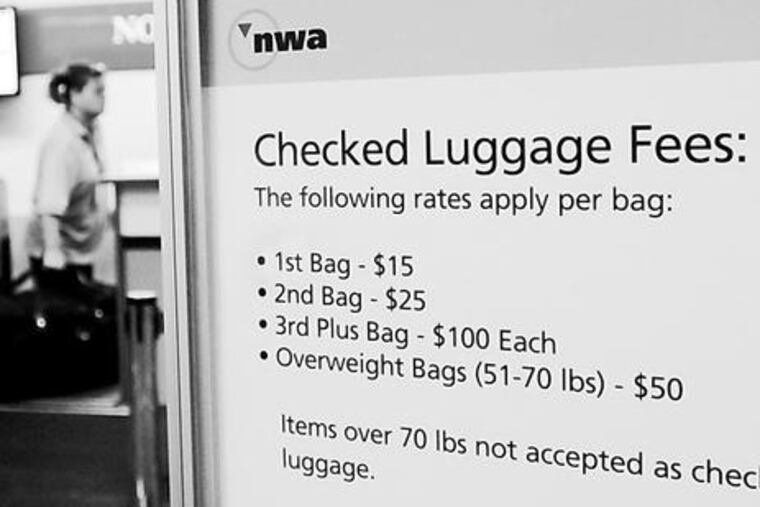Airlines' grip on baggage fees is firm
ATLANTA - When airlines started charging some passengers $15 or more earlier this year to check their bags, the carriers blamed soaring fuel costs. Since then, oil prices have plummeted.

ATLANTA - When airlines started charging some passengers $15 or more earlier this year to check their bags, the carriers blamed soaring fuel costs. Since then, oil prices have plummeted.
Yet the industry hasn't stowed away the bag fees.
The reason is simple: Airlines are still losing money, though now largely because of the recession instead of the costs of jet fuel.
And don't expect the fee to disappear even when the economy rebounds. Airlines are finding the fees to be a reliable source of revenue, and they say such charges allow passengers to choose only the services they want. In their financial reports, airlines do not break out the revenue brought in by baggage fees.
Passengers are being socked, on average, $15 for the first bag they check and $25 for the second.
"I think it's unfair, and I think it's highway robbery," said Benjamin Johnson, 38, a government employee, as he headed from Atlanta to Orlando, Fla., recently.
For the airlines, the bag fees, on top of charges for other once-free amenities such as meals, provide a financial boost. The industry is expected to lose $4 billion for 2008, excluding onetime items, said Ray Neidl, an airline-industry analyst for Calyon Securities Inc., of New York. That's despite the plunge in the price of a barrel of oil from $147 in July to $35.35 yesterday.
Airlines now say they are being hurt by the recession, which has caused demand for seats to drop. The International Air Transport Association said global passenger traffic declined 1.3 percent in October from a year earlier.
Airlines also have been weighed down by bad bets they made on the price of fuel when it was skyrocketing. After locking in at prices that looked reasonable earlier this year, some are paying substantially more than market price for a portion of their fuel.
"While fuel prices have fallen, the economy has created a new uncertainty for us, and the industry's going to lose billions of dollars this year," said Doug Parker, chief executive officer of US Airways Group Inc., the dominant carrier at Philadelphia International Airport. "Indeed, it was fuel-driven economic concerns, but now we have different economic concerns. And having said that, I, for one at least, believe it's the right model for the business, irrespective of what environment we're in."
Airlines say the fees are a new way of doing business in which services that were once bundled into the price of a ticket are offered a la carte. However, average fares for domestic flights rose 8.1 percent nationally and 8.5 percent in Philadelphia from the second quarter of 2007 to the same quarter this year, according to the U.S. Department of Transportation's most recent figures.